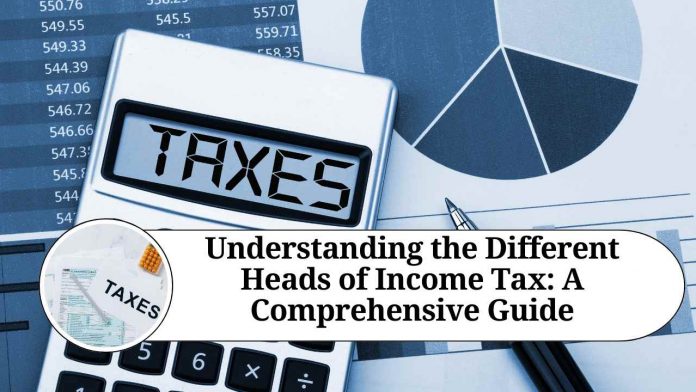Introduction
Income tax is an essential part of our lives, and understanding its various components is crucial for every taxpayer. The tax system is designed to generate revenue for the government, and it classifies income into different heads for the purpose of taxation. In this blog, we will explore the various heads of income tax, shedding light on their definitions, applicability, and relevant provisions.
- Income from Salary: Income from salary is one of the most common heads of income tax. It includes any income received by an individual as a result of their employment. This can include basic salary, allowances, bonuses, commissions, and perks. The employer deducts tax at source (TDS) from the employee’s salary based on the applicable tax slab.
- Income from House Property: Income from house property encompasses any income generated from a property owned by an individual. It includes rental income from letting out a residential or commercial property, and even the deemed rental income from vacant properties. Deductions are available for standard property tax, home loan interest, and other related expenses.
- Profits and Gains from Business or Profession: This head covers income earned by individuals or entities engaged in business or professional activities. It includes profits from trading, manufacturing, consultancy, freelancing, and other similar activities. The tax liability is computed after deducting allowable expenses like rent, salaries, utility bills, depreciation, and interest on business loans.
- Capital Gains: Capital gains arise when there is a profit or gain from the sale or transfer of a capital asset, such as real estate, stocks, or mutual funds. It is categorized as short-term capital gains (assets held for less than 24 months) and long-term capital gains (assets held for more than 24 months). The tax rates differ for each category, and individuals can claim exemptions or deductions under specific conditions.
- Income from Other Sources: Income from other sources is a residual category that includes income that does not fit into any of the above heads. It covers income from interest on savings accounts, fixed deposits, dividends, lottery winnings, royalty income, etc. The tax rates for such income are typically based on the individual’s applicable tax slab.
Conclusion
Understanding the different heads of income tax is essential for every taxpayer to ensure compliance and make informed financial decisions. By familiarizing yourself with the various categories and related provisions, you can effectively plan your taxes, avail deductions, and minimize your tax liability. It is always advisable to consult with a tax professional or seek guidance from the tax department to ensure accurate reporting and adherence to the applicable tax laws.
Remember, tax laws and regulations are subject to change, so staying updated and aware of any modifications is crucial. By being proactive and knowledgeable, you can navigate the complex world of income tax with confidence, ensuring financial stability and peace of mind.
Disclaimer
This blog provides general information and should not be considered as professional tax advice. Consult a qualified tax professional for personalized guidance related to your specific tax situation.
Other Related Blogs: Section 144B Income Tax Act
Frequently Asked Questions (FAQs)
Q. What are the different heads of income tax?
The different heads of income tax include:
Income from Salary
Income from House Property
Profits and Gains from Business or Profession
Capital Gains
Income from Other Sources
Q. What falls under the head “Income from Salary”?
Income from Salary includes any income received by an individual as a result of their employment. This can include basic salary, allowances, bonuses, commissions, and perks.
Q. What is considered as “Income from House Property”?
Income from House Property includes rental income from letting out a residential or commercial property, and even the deemed rental income from vacant properties.
Q. What does “Profits and Gains from Business or Profession” cover?
This head covers income earned by individuals or entities engaged in business or professional activities. It includes profits from trading, manufacturing, consultancy, freelancing, and other similar activities.
Q. What is meant by “Capital Gains”?
Capital gains arise when there is a profit or gain from the sale or transfer of a capital asset, such as real estate, stocks, or mutual funds. It is categorized as short-term capital gains (assets held for less than 24 months) and long-term capital gains (assets held for more than 24 months).
Q. What income is categorized as “Income from Other Sources”?
Income from Other Sources is a residual category that includes income that does not fit into any of the above heads. It covers income from interest on savings accounts, fixed deposits, dividends, lottery winnings, royalty income, etc.
Q. Are there any deductions available under each head of income?
Yes, there are specific deductions available under each head of income. For example, under Income from House Property, deductions can be claimed for standard property tax, home loan interest, and related expenses. Similarly, other heads may have specific deductions or exemptions applicable.
Q. How are taxes calculated under each head of income?
The tax calculation varies for each head of income. The applicable tax rates, deductions, exemptions, and other provisions differ depending on the specific head. It is important to refer to the income tax laws and consult with a tax professional or use tax calculation tools to accurately calculate taxes.
Q. Can I carry forward losses from one head of income to set off against another head in future years?
Yes, in certain cases, losses incurred under one head of income can be carried forward to set off against income under another head in future years. However, there are specific rules and restrictions regarding the set-off and carry forward of losses, which need to be understood and applied correctly.
Q. What should I do if I have income falling under multiple heads?
If you have income falling under multiple heads, it is essential to correctly classify and report the income under the appropriate heads while filing your tax return. Seek guidance from a tax professional to ensure accurate reporting and maximize available deductions.




















